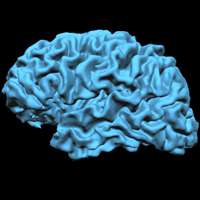April 4, 2013 report
Research effort reveals differences in brain activity for two types of mental illness

(Medical Xpress)—Researchers in Australia have uncovered what they describe as differences in brain behavior for people diagnosed with either bipolar disorder (BP) or borderline personality disorder (BPD). As they describe in their paper published in the journal Molecular Psychiatry, brain scans of people diagnosed with one or the other of the disorders show differences in the ways emotions are processed, leading perhaps to a true biological marker for the two ailments.
BP is generally characterized by wild mood swings. Those with BPD also exhibit mood swings but also are generally described as being impulsive, likely suicidal and have problems with interpersonal relationships. Traditionally, people are diagnosed with one or the other by professionals trained to spot the signs and to distinguish between the two. Because of this, most experts in the field believe many patients are misdiagnosed, which is a serious problem because BP is most often treated with drugs, while BPD is treated with various forms of therapy. Scientists have been searching for a biological marker for both disorders as well as for a host of other mental diseases for several years all to no avail. In this new research, it appears the team from Australia has made a breakthrough.
To nudge the brains of BP and BPD patients into revealing their differences, the researchers enlisted volunteers with one or the other disorder as well as some people who do not suffer from any mental ailment. All were asked to engage in a task known as an emotional Stroop—it's where people are asked to engage in a task that taxes the emotional parts of the brain. In this case, they were asked to do so while having their brain scanned.
The scans revealed that those with BP were able to function quite normally under normal conditions, but when taxed, their brains were found to have to work harder than normal to keep up. Those with BPD on the other hand, showed heightened activity in the amygdala, a part of the brain normally associated with fear response.
The results are preliminary, of course, and will have to be duplicated by others, but at this point, it looks like this new research could mark a turning point in mental illness diagnosis. Being able to prove a person has either disorder or even something else could have a profound impact on the science of mental illness, doctors and of course patients and how they are treated by both physicians and insurance company's who often refuse to pay for treatment for diseases that can't be proved to exist.
More information: Differential engagement of the fronto-limbic network during emotion processing distinguishes bipolar and borderline personality disorder, Molecular Psychiatry , (26 February 2013) doi:10.1038/mp.2013.22
Abstract
Bipolar disorder (BD) and borderline personality disorder (BPD) are common and burdensome psychiatric illnesses that are difficult to distinguish, primarily because emotion dysregulation is a core feature of both. Normally, emotion regulation involves both 'top-down' and 'bottom-up' processes of control and regulatory feedback that engage the fronto-limbic network (FLN), and it is hypothesized that disturbances in this network produce the vicissitudes of mood and affective lability that characterize BD and BPD, respectively. Within the FLN, it is the dorsolateral, ventrolateral and medial prefrontal cortices (dl-PFC, vl-PFC and m-PFC) along with limbic structures, such as the amygdala (Ag) and hippocampus that have been most commonly implicated in emotion processing and regulation.
© 2013 Medical Xpress














